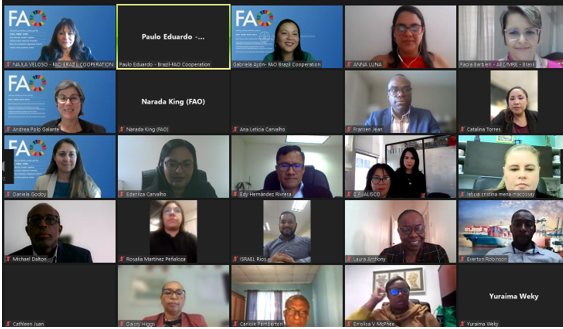Around 60 professionals from Caribbean countries and institutions took part in the 2nd session of a series of trainings on resilient and sustainable school feeding programmes
Brasília, December 16, 2022 – More than 60 professionals from eight Caribbean countries participated in the second part of a series of sessions focused on resilient and sustainable school feeding programmes. The initiative is carried out jointly by the Food and Agriculture Organization (FAO), the Brazil-FAO International Cooperation, and the Mexico-CARICOM-FAO Initiative.
The sessions are divided into three parts and have the participation of practitioners and managers of school feeding programmes from the Bahamas, Belize, Guyana, Jamaica, St. Lucia, St. Vincent and the Grenadines, Suriname, and Trinidad and Tobago. The series of sessions result from a joint collaboration between FAO, the National System for Integral Family Development (SNDIF) of the government of Mexico, through the Mexico-CARICOM-FAO Initiative: “Cooperation for Climate Change Adaptation and Resilience in the Caribbean”; and the FAO-Brazil Technical Cooperation: “Consolidation of School Feeding Programmes in Latin America and the Caribbean”.
The activities aim to promote different approaches, tools, and lessons learnt from addressing food and nutrition education, public procurement, school gardens and legal frameworks of school feeding programmes.

Daniela Godoy, senior policy officer of FAO, opened the session stating that this training offers an opportunity to look at various topics associated with linking national school feeding programmes with local products, a secure market for smallholder farmers. She further indicated that “it is also an opportunity to facilitate access and affordability of healthy diets”.
Francisco Meza, in charge of the General Direction of Food and Community Development of the National System for Integral Family Development (SNDIF), thanked all the participants and renewed the interest and commitment of the Government of Mexico to continue cooperating on school feeding.
Edenilza Carvalho, representing Brazil’s National Fund for Educational Development (FNDE), which coordinates the Brazilian National School Feeding Programme, emphasized the importance of the school feeding programme as a policy to not only fight hunger, but importantly address malnutrition in all its forms. “We are proud to know that many countries are interested in exchanging experience and knowledge with us. And so are we willing to do so”, said her. “There is still a lot to do”.
Paola Barbieri, project’s analyst of the Brazilian Cooperation Agency (ABC), informed that school feeding is a priority for Triangular South-South Cooperation, especially at this moment. “The connection between school feeding and family farming is a very positive combination because many experiences show the concrete results in the improvement of students’ nutrition, contributing to the transformation of food systems”.
Andrea Polo Galante, senior nutrition consultant at FAO, talked about the factors that enable the establishment of public procurement from family farming, using the homegrown school feeding approach of FAO. She referred to the importance of multi-sectoral approach and inter-institutional collaboration, and alignment with national policy and legal frameworks. From the supply standpoint, Andrea highlighted the importance of mapping smallholders farmers and their products, as well as addressing constraints and challenges faced associated with volumes and t quality and safety requirements.
Engaging in collective markets and access to finance are also relevant, said Galante. From the demand side, the expert pointed out some important barriers associated with adequate funds, adapted and inclusive procurement procedures and practices, and institutional capacities and the infrastructure of school kitchens.
Experiences
The session counted on experiences from Brazil, Mexico and Saint Vincent and the Grenadines. From Mexico, Edy Hernández Rivrera presented a project on agroecology schools, which raises the interest of the students on issues related to water and land management, local culture and history, as well as fostering solidarity within communities.
Also from Mexico, Herelinda Alvarez Arreola, presented an experience on school gardens used as a pedagogical tool in the region of Jalisco. She underscored how the gardens offer educational resources necessary for children to understand more about food, by giving them the chance to sow and harvest. “They teach us to eat in a balanced way and to understand what the books teach us”.
Another experience from Mexico was highlighted by Leticia Mena, from the Yucatan province. She presented the process of public procurement from family farmers and the establishment of school gardens in this province.
From Brazil, Anna Luna, from the city of Maceio, spoke about the importance of the Brazilian legal framework to guarantee the procurement of agricultural products from local farmers. She also defended the importance of training the technicians who make the purchases as well the ones who are in direct contact with the farmers on the field. “We need to articulate all of the necessary steps to make the public purchase happen. And legal frameworks support that”.
The experience of Saint Vincent and the Grenadines was presented by Michael Dalton, from the Inter-American Institute for Cooperation on Agriculture (IICA). It was about public procurement from small farmers for school feeding, and school gardens establishment. He emphasized the training of producers which was key to guarantee good results. The establishment of demonstration plots to use as pedagogical tools was also mentioned, as well the maintenance of vegetable gardens at 6 schools. Dalton said the collaboration of partners from the private and public sector have an equally important role to play, and that fluid coordination is necessary to achieve the changes desired.
Next activity
The last session will focus on governance, policy and legal frameworks for school feeding. It will be held during the first quarter of 2023.
Link for register: https://fao.zoom.us/meeting/register/tJEqf-qurzwtHtKq_XiOZk-8OSa7rfZ9K68d


